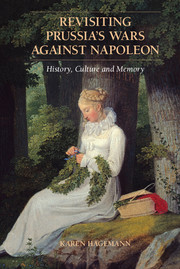Book contents
- Frontmatter
- Epigraph
- Contents
- List of Figures and Maps
- List of Abbreviations
- Acknowledgments
- Revisiting Prussia’s Wars against Napoleon
- Part One A History of Defeat, Crisis and Victory
- Part Two Discourses on the Nation, War and Gender
- Part Three Collective Practices of De/Mobilization and Commemoration
- 8 Military Service
- 9 War Charity
- 10 De/Mobilizing Society
- 11 Honoring and Commemorating War Heroes
- Conclusion
- Part Four Literary Market, History and War Memories
- Part Five Novels, Memory and Politics
- Epilogue Historicizing War and Memory, 2013–1813–1913
- Bibliography
- Name Index
- Subject Index
- Plate section
- References
9 - War Charity
Patriotic Women’s Associations
Published online by Cambridge University Press: 05 March 2015
- Frontmatter
- Epigraph
- Contents
- List of Figures and Maps
- List of Abbreviations
- Acknowledgments
- Revisiting Prussia’s Wars against Napoleon
- Part One A History of Defeat, Crisis and Victory
- Part Two Discourses on the Nation, War and Gender
- Part Three Collective Practices of De/Mobilization and Commemoration
- 8 Military Service
- 9 War Charity
- 10 De/Mobilizing Society
- 11 Honoring and Commemorating War Heroes
- Conclusion
- Part Four Literary Market, History and War Memories
- Part Five Novels, Memory and Politics
- Epilogue Historicizing War and Memory, 2013–1813–1913
- Bibliography
- Name Index
- Subject Index
- Plate section
- References
Summary
“Heroic Maidens and Women of a Great Era,” is the title of a brochure in the popular series “When Germany Awoke: The People and Events of the Wars of Liberation,” which appeared in 1913 to commemorate the one-hundredth anniversary of the wars of 1813–15. To be sure, the centenary mainly honored the “heroic deeds” of the “brave national warriors” – the volunteers and militiamen who had gone to battle. The observance also paid homage, however, to the “great sacrifices” made by “German women” during these wars. By 1913 it was generally acknowledged that wars fought with conscript armies could be conducted most successfully when they were accompanied by a general mobilization of civilian and military society. This implied that the broad support of women was also necessary for victory. In order to convey this insight to women and girls in the bellicose era on the eve of the First World War, authors of brochures that addressed female readers regularly referred to the “heroic age” of hundred years before, in which, in their interpretation, patriotic consciousness had “awakened” in men and women alike, and members of the “female sex” had actively committed themselves to the fatherland for the first time. The pamphlet noted accordingly that
The incomparable awakening of German woman by the wars of subjugation and liberation, the unanimous gathering together of German women’s will to co-operate and sacrifice for their downtrodden fatherland, was preceded by a miserable era of national indifference and the affected aping of French manners among German women. [...] That Germany’s women could not yet participate in patriotic life before the Wars of Liberation is understandable in the light of the circumstances prevailing in those days. The gradual development of events put a slow and belated end to these slumbers, these unexploited female powers, and one by one assigned women tasks to perform in the service of their fatherland. The Wars of Liberation produced this unleashing of female powers with sudden élan in the springtime of nations of 1813.
- Type
- Chapter
- Information
- Revisiting Prussia's Wars against NapoleonHistory, Culture, and Memory, pp. 194 - 207Publisher: Cambridge University PressPrint publication year: 2015



